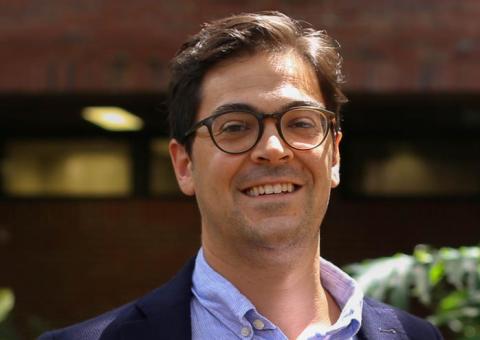Mark Pacheco
Assistant Professor
About
Mark B. Pacheco is an Assistant Professor in the School of Teaching & Learning at the University of Florida’s College of Education. He received his Ph.D. in Learning, Teaching & Diversity from Vanderbilt University’s Peabody College, and his master’s degree in education from the City College of New York. He received a bachelor’s degree in English and Italian from Georgetown University. Dr. Pacheco’s most recent research focuses on ways that teachers can foster students’ character development within literacy and language instruction. In particular, he examines how students of diverse cultural and linguistic backgrounds can cultivate virtue through meaningful engagements with grade-level texts.
Along with this work, Dr. Pacheco has an active body of research that explores (1) multimodal and multilingual approaches to literacy instruction, and (2) responsive instruction for diverse learners in science classrooms. His work has been supported by grants from the Spencer Foundation, the National Science Foundation, and UF’s College of Education. He has published his research in Journal of Literacy Research, Reading Research Quarterly, Journal of Adolescent & Adult Literacy, TESOL Quarterly, and Urban Education.
Dr. Pacheco has extensive experience leading professional development for in-service and pre-service teachers.
Prior to his work in academia, he taught high school English and ESL in New York City.
Along with this work, Dr. Pacheco has an active body of research that explores (1) multimodal and multilingual approaches to literacy instruction, and (2) responsive instruction for diverse learners in science classrooms. His work has been supported by grants from the Spencer Foundation, the National Science Foundation, and UF’s College of Education. He has published his research in Journal of Literacy Research, Reading Research Quarterly, Journal of Adolescent & Adult Literacy, TESOL Quarterly, and Urban Education.
Dr. Pacheco has extensive experience leading professional development for in-service and pre-service teachers.
Prior to his work in academia, he taught high school English and ESL in New York City.
Affiliations
- School of Teaching and Learning
Research Interests
Bilingual / Bicultural Education, Digital Tools in Qualitative Research, ESOL, Multicultural Literacy, Qualitative Research
Education
- Ph.D. in Learning, Teaching, and Diversity, 2016 Vanderbilt University's Peabody College of Education
- M.S. in Teaching English to Speakers of Other Languages, 2009 The City College of New York
- B.A. in Italian and English, 2006 Georgetown University and Université di Firenze
Professional Appointments
- Assistant Professor of ESOL/Bilingual Education, School of Teaching and Learning, University of Florida, 2018 - Present
- Assistant Professor of Bilingual/Bicultural Education, School of Teaching and Learning, Illinois State University, 2016 - 2018
- English and ESL Teacher, High School of Fashion Industries, New York, NY, 2007 - 2011
- Adolescent & Adult ESL Teacher, The Lado Institute, Washington, D.C; TASIS, England; EF Dil Okulu, Istanbul, 2006 – 2008
Activities and Honors
- Bilingual Research Journal’s Outstanding Early Career Reviewer (2021)
- Vanderbilt's Otto C. Bassler Dissertation Award for Outstanding Research (2016)
- National Council of Teachers of English Alan C. Purves Award for Using Translation to Drive Conceptual Development for Students Becoming Literate in English as an Additional Language, with Robert Jiménez (2015)
Selected Grants
Responsive Instruction for Emergent Bilingual Learners in Biology Classrooms
Role
- Co-PI
Funding Agency
- National Science Foundation - DRK12 program
Project Period
- 2020 - 2023
Award Amount
- $1,120,163
Project TRANSLATE
Role
- Co-PI
Funding Agency
- Lyle Spencer Research Award.
Project Period
- 2018 - 2021
Award Amount
- $955,090
Project RISE: Responsive Instruction in Science Education
Role
- PI
Funding Agency
- University of Florida College Research Incentive Fund
Project Period
- 2018-2019
Award Amount
- $38,705
Selected Publications
Recent Publications
- Pacheco, M. B., McKee, J., & Lai, Y. (in press). Little things can be big: Character education in the literacy classroom for multilingual learners. In V. Risko & D. Walker-Dalhouse (Eds.). Achieving equity for students in poverty: Literacy instruction that makes a difference. New York: Teachers College Press.
- Daniel, S., Pacheco, M. B., Burriss, S., Smith, B. E., & Hundley, M. (2023). Cultivating writerly virtues: critical human elements of multimodal writing in the age of artificial intelligence. Journal of Adolescent & Adult Literacy.
Other Research
- Pacheco, M. B., & Brown, J. C. (2022). Newcomer emergent bilingual students’ meaning-making in biology classrooms: A communities of practice perspective. Urban Education.
- Pacheco, M. B., Daniel, S., Pray, L., & Jimenez, R. T. (2019). Translingual practice, strategic participation, and meaning-making. Journal of Literacy Research, 51(1), 75-99.
- Pacheco, M. B. (2018). Spanish, Arabic and “English-only”: Making meaning across languages in two classroom communities. TESOL Quarterly, 52(4), 995-1021.
- Pacheco, M. B., Smith, B. E., & Carr, S. (2017). Connecting classrooms and communities with language and technology: A multimodal codemeshing project. Voices from the Middle, 24(3), 65-69.
- Pacheco, M. B., & Miller, M. E. (2015). Making meaning through translanguaging in the literacy classroom. The Reading Teacher, 69(5), 533-537.

